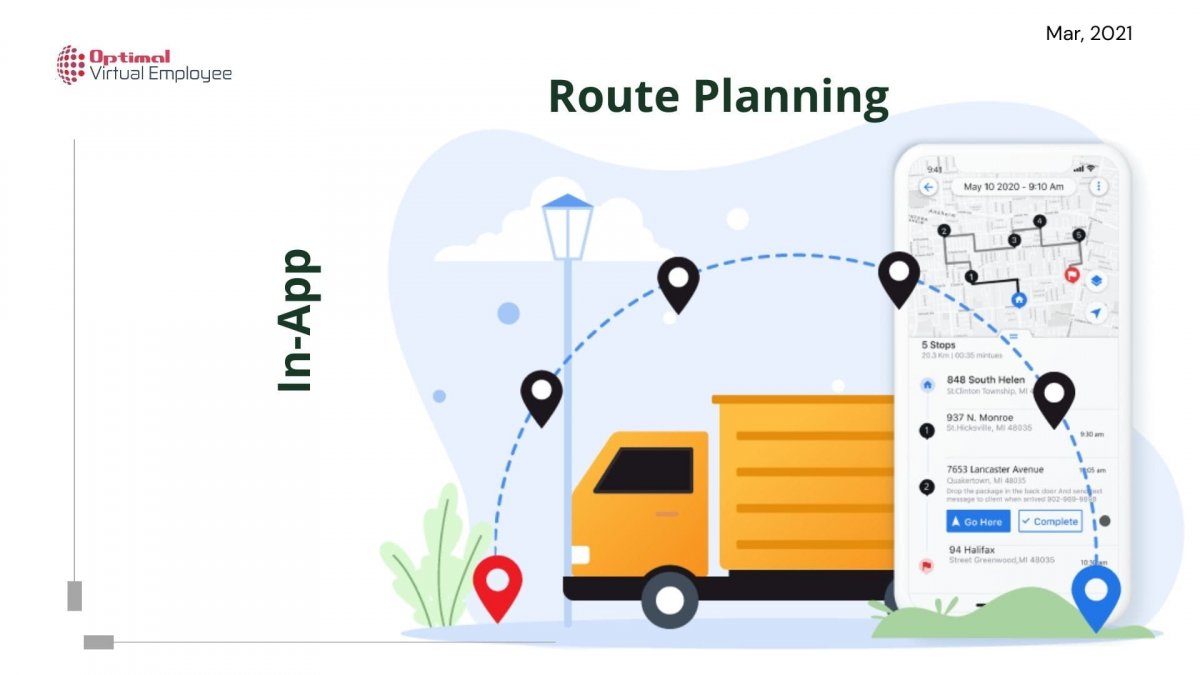Let’s be frank. Stopping in the middle of nowhere to ask a stranger for directions is as absurd as can be. Today, we have a more reliable alternative that lets us be sure of where we reach, how we do it, and how much time.
With the surge in online shopping, even logistic partners need to create time-saving routes to accommodate different location points at one go. There is a need to decide cost-efficient and time-saving routes during last-mile delivery management, making scope for driver’s time management given the ELD mandate and even finding nearest fuelling stations.
Intelligent route plans are designed while counting on all these factors, but this can slow down the delivery pace and level up the operational expense.
Whatever the case be, the need for a robust route planning algorithm in an app is evident during mobile app development. App developers can automate route planning through ready-made route planning software. It’s convenient to pick some route optimization software and use it to solve your planning needs in an app.
For example, Onfleet is a SaaS offering for route management that offers a ready yet stand-alone platform and an API that can automate delivery routes and create delivery reports. One more example can be Route4me that spans its use across functionalities like route planning, voice-based navigation, user notifications, data analytics etc.
You can choose a market-ready route planning software depending on your needs, or you can get a custom in-app route planning developed into your app from scratch.
A Guide to In-App Route Planning During Fleet Management
Route planning for a fleet needs constant consideration of complex data like truck capacity, time frames and current traffic updates. Discussed below is a list of things that should be focused on:
-
Real-Time Traffic
App developers must ensure that their algorithms should share results depending on updates about roadblocks, traffic jams and other such impediments on the route during route creation.
-
Schedule Optimization
An app with route planning must also consider delivery schedules and time frames to help businesses be premier at deliveries.
-
Real-Time Delivery Tracking
App developers should ensure that delivery managers understand the way the route is followed in real-time. This feature can mitigate delivery goof ups and help them reschedule deliveries more promptly if the need be.
-
Truck Capacity
Premium route planning apps have algorithms that address capacitated vehicle routing problems.
-
Forbidden zones
Now logistics managers can add forbidden areas on their map to indicate areas in which the mobile app should not highlight the user’s routes.
-
ELD Mandate
Logistic managers can invigilate a driver’s efficiency on the route and allow them to set limits for drivers and their working hours.
-
Analytics and Reporting
App developers must design apps that can follow routes and aid drivers in comparing their performance and client satisfaction over time.
How to Integrate Ready-Made Route Planning APIs?
Robust route planning can only be done using crucial information like traffic updates, maps and the user’s destinations. There are some ready-made APIs available in the maps and navigation marketplace with all the necessary considerations. These solutions are easy to integrate during app development.
-
Google Maps Platform
Google Maps Platform is a cloud-based offering for logistical automation. It helps app developers with optimal routes considering various vehicles, including multi-stop sprees, traffic clusters, no. of turns and even impediment consideration etc.
-
Mapbox
App developers love the unique use-cases brought forward by multiple APIs that Mapbox brings to the table. Mapbox Navigation service is perfect for route-planning and wayfinding as it leverages real-time traffic updates. It can help apps calculate optimize ways, directional navigation and beat roadblocks.
How to Build Route Planning Functionality into Your App from Scratch?
App developers can work out route planning algorithms from scratch to ensure exclusive customizations, lay down bespoke rules and craft routes in a way that cover the specific use-cases of the client businesses.
Machine learning aids the planning of routes in an optimized manner. Brand new entrants in the market is an ML-powered algorithm known as ant colony optimization. This ML algorithm can imitate the way ants work to locate the shortest and most efficient route from the food source to their colonies.
It first calculates all the various possible routes to a destination and then revisits their point where it all begins only to search for alternate ways. It then compares various routes and checks the number of times each route can be explored in a fixed span.
It highlights the one that can be covered the most number of times in that span. However, given the transitory nature of traffic, if a new alternative route or a completely new route surfaces, ML helps the algorithm recalculate the optimal route. App developers must design a polished system for curating route plans, scheduling deliveries and allow manual route editing if need be.
A good route optimization solution will bring the business’s operational expenses down and increase their operational efficiency. Smart route optimization in an app can be done by creating a logistic tracking software system. Hire app developers and get the best results for your business.
Read More:
Top 5 Custom Mobile App Development Companies for Your Next Project
Running a Software Development Company? 5 Things to Know without an Exception









